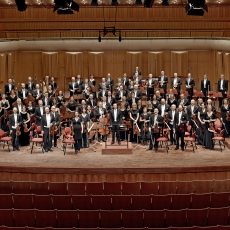Robin Ticciati & SRSO - Berlioz: Romeo et Juliette - MusicWeb International
I've been following Robin Ticciati's Berlioz series for Linn with considerable interest. The enthusiasm with which Dan Morgan and Simon Thompson greeted his account of the Symphonie fantastique led me to believe that the recording was something special and when I acquired it for myself I was not disappointed. The disc that included Les nuits d'été was no less impressive. Both those discs featured the Scottish Chamber Orchestra. For his next Berlioz recording Ticciati moved across the North Sea to set down L'enfance du Christ with the Swedish Radio Choir and Symphony Orchestra, again with very satisfying results. Now he's returned to Sweden to record Roméo et Juliette. I don't know if any of his previous Berlioz discs were recorded live - it's not obvious from the documentation accompanying them - but this latest release stems from live performances. I should say at once that there's no audible evidence of the audience during the performance and no applause at the end.
Roméo et Juliette resulted from Berlioz's twin obsessions with Shakespeare and the actress, Harriet Smithson. Typically, he didn't do anything so conventional as simply to set all or part of Shakespeare's play. Instead he based his symphony on an 18th century version of the play devised by David Garrick. Significantly, it was this version in which Harriet had appeared. It took several years for the symphony to come to fruition and even then Berlioz tinkered with it after the first performance in 1839. The score as we know it today was published after the fifth performance of the work in 1846. Here Robin Ticciati uses the Bärenreiter edition, which is the 1846 score, I believe.
I enjoyed this performance very much. Robin Ticciati has a genuine feel for the music of Berlioz and there's freshness and vitality in his conducting. That's evident from the outset when the orchestra really hurtles into the string fugato, the music impelled forward with great urgency and tension. A few minutes later the trombones are suitably magisterial during the Prince's Intervention. Throughout the set the SwRSO plays exceptionally well for Ticciati. The Ball scene, for example, surges along, the playing vital and highly spirited. A little earlier the mercurial ‘Mab' scherzetto is delivered with pinpoint accuracy and later on in the work when the Queen Mab scherzo is reached the music is gossamer light and beautifully articulated. The section ‘Roméo au tombeau des Capulets' is full of dramatic intensity in Ticciati's hands as Berlioz whips the listener through a wide range of emotions in just a few minutes. Here, the orchestral response is consistently acute.
The one minor disappointment I have comes in the Scène d'amour. This movement, one of my favourite passages in all Berlioz, was part of the programme on Ticciati's disc of Les nuits d'été. On that occasion he played the concert version which omits the choral contributions near the start from guests wending their way home after the ball; that accounts for the difference of some two minutes between the two performances. In this present recording Ticciati seems to rein in significantly the SwRSO strings in the matter of vibrato. In some parts of the score the resulting leanness of sound works well - ‘Convoi funèbre de Juliette' is a case in point - but in Scène d'amour it robs the music of some of the necessary warmth. That's not the case in the recording with the Scottish Chamber Orchestra.
Berlioz uses three vocal soloists. Of the three, the bass, who is Friar Laurence, has the most to do, though he has to wait until the very end to sing. Alistair Miles is very convincing in the way he laments the waste of the lives of the two young lovers and reproaches the Montagues and Capulets bitterly for their feud which has brought about the tragedy. Berlioz wrote some very powerful, dramatic music for the Friar and Miles rises to the occasion strongly.
The Swedish mezzo, Katija Dragojevic is a singer I haven't heard before but I really appreciated her account of ‘Strophes'. Her tone falls very pleasingly on the ear and her singing is clear and expressive. Davis's mezzo, Olga Borodina does well but her tone is fuller and I prefer Miss Dragojevic. Andrew Staples has the brief ‘Mab, la messagère' to sing. He employs a suitably Gallic ring and he sings with complete precision and great dexterity. Good though Thomas Moser is for Davis he's shaded by Staples.
The contribution of the Swedish Radio Choir is excellent throughout. Berlioz's choral writing is very tricky and requires tremendous precision. This the Swedish singers deliver in spades and their French sounds pretty convincing to me.
I've referred to Ticciati's conducting already. Just to expand a little, his conducting is vital and displays a fine sense of drama. Where the music takes on a more tender or tragic hue Ticciati is just as adept. On the evidence of this and previous recordings he really has a genuine flair for Berlioz. I look forward to hearing him in more of this great composer's music.
This is, I believe, the first of Ticciati's Berlioz recordings that has come out as a CD rather than SACD. However, the sound is still pretty impressive. Philip Hobbs has given us a recording that is clear and vital. I do wonder if sometimes the recording is just a fraction too close but there's no doubt that Berlioz's imaginative and colourful score leaps out of the loudspeakers. There are several instances where the choir sings from the distance and these effects are very well conveyed, as are divisions into two choirs. The documentation is comprehensive and includes expert notes by Hugh Macdonald.
This is a distinguished addition to Robin Ticciati's Berlioz series. More please.





